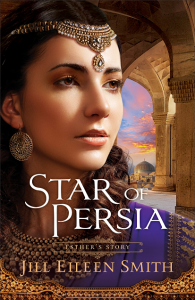In Star of Persia, you reference palace intrigue and politics. How did these affect Esther?
 In my research of ancient Persia, I came across some of Herodotus’s writings about Xerxes and his family. Ancient history (outside of the Bible) claims that Xerxes was married to a woman named Amestris. Some scholars think that she could have been either Vashti or Esther.
In my research of ancient Persia, I came across some of Herodotus’s writings about Xerxes and his family. Ancient history (outside of the Bible) claims that Xerxes was married to a woman named Amestris. Some scholars think that she could have been either Vashti or Esther.
By her character, I did not see Amestris as likely to be either one of them. So I brought her character into the story, which naturally caused more intrigue in the palace simply because she wanted power. She wanted to be queen, but Vashti was queen, then Esther was. If this woman truly existed and if the biblical account can be meshed with other history, then I think Vashti and Esther might have been in danger because of this woman’s desires.
Amestris was said to be cunning and cruel—two qualities that would easily put her in the center of or at least part of palace intrigue and politics. Esther would have known that her life and position were always a target for this conniving wife.
What do you hope readers will gain from reading Star of Persia?
I hope readers will experience Esther’s story in a way they never have before. I hope they see that secular history and biblical history can fit together, and that even though God is not mentioned in the biblical account, we can see His handiwork all over its pages. It’s simply hidden, as though God is working behind the scenes, which He often does.
Booklist named your book The Prophetess as one of their Top 10 Inspirational Fiction titles. When did you first start writing biblical fiction, and why did you decide upon this genre?
 I am truly honored to know that Booklist would give The Prophetess such high acclaim. That book was probably one of the hardest I have ever written, and it was the only one I took back from my editor to redo the ending before I finally turned it in.
I am truly honored to know that Booklist would give The Prophetess such high acclaim. That book was probably one of the hardest I have ever written, and it was the only one I took back from my editor to redo the ending before I finally turned it in.
As for writing biblical fiction, I have loved the genre since I read Two from Galilee by Marjorie Holmes when I was sixteen. I realized in that moment of closing the book that those people were real.
I read every book I could find in the genre after that, but I didn’t ever think I’d write a book in that genre (or any book, for that matter) until after I co-taught a Bible study on King David’s life. That study eventually became the Wives of King David series, which Revell went on to publish in 2009 to 2011. They’ve continued to support my biblical novels ever since.
Click thru to discover how Jill writes about historical figures when there are few details to go on…


